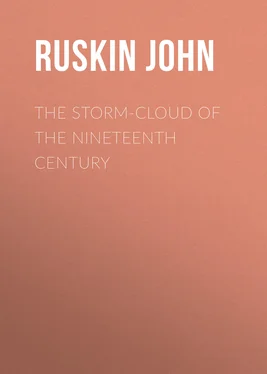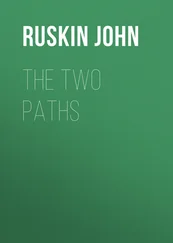John Ruskin - The Storm-Cloud of the Nineteenth Century
Здесь есть возможность читать онлайн «John Ruskin - The Storm-Cloud of the Nineteenth Century» — ознакомительный отрывок электронной книги совершенно бесплатно, а после прочтения отрывка купить полную версию. В некоторых случаях можно слушать аудио, скачать через торрент в формате fb2 и присутствует краткое содержание. Жанр: foreign_prose, literature_19, foreign_antique, на английском языке. Описание произведения, (предисловие) а так же отзывы посетителей доступны на портале библиотеки ЛибКат.
- Название:The Storm-Cloud of the Nineteenth Century
- Автор:
- Жанр:
- Год:неизвестен
- ISBN:нет данных
- Рейтинг книги:3 / 5. Голосов: 1
-
Избранное:Добавить в избранное
- Отзывы:
-
Ваша оценка:
- 60
- 1
- 2
- 3
- 4
- 5
The Storm-Cloud of the Nineteenth Century: краткое содержание, описание и аннотация
Предлагаем к чтению аннотацию, описание, краткое содержание или предисловие (зависит от того, что написал сам автор книги «The Storm-Cloud of the Nineteenth Century»). Если вы не нашли необходимую информацию о книге — напишите в комментариях, мы постараемся отыскать её.
The Storm-Cloud of the Nineteenth Century — читать онлайн ознакомительный отрывок
Ниже представлен текст книги, разбитый по страницам. Система сохранения места последней прочитанной страницы, позволяет с удобством читать онлайн бесплатно книгу «The Storm-Cloud of the Nineteenth Century», без необходимости каждый раз заново искать на чём Вы остановились. Поставьте закладку, и сможете в любой момент перейти на страницу, на которой закончили чтение.
Интервал:
Закладка:
In the entire system of the Firmament, thus seen and understood, there appeared to be, to all the thinkers of those ages, the incontrovertible and unmistakable evidence of a Divine Power in creation, which had fitted, as the air for human breath, so the clouds for human sight and nourishment;—the Father who was in heaven feeding day by day the souls of His children with marvels, and satisfying them with bread, and so filling their hearts with food and gladness.
Their hearts , you will observe, it is said, not merely their bellies,—or indeed not at all, in this sense, their bellies—but the heart itself, with its blood for this life, and its faith for the next. The opposition between this idea and the notions of our own time may be more accurately expressed by modification of the Greek than of the English sentence. The old Greek is—
ἐμπιπλῶν τροφῆς καὶ ἐυφροσύνης
τὰς καρδίας ήμῶν.
filling with meat, and cheerfulness, our hearts. The modern Greek should be—
ἐμπιπλῶν ἀνέμου καὶ ἀφροσύνης
τὰς γαστέρας ἡμῶν.
filling with wind, and foolishness, our stomachs.
You will not think I waste your time in giving you two cardinal examples of the sort of evidence which the higher forms of literature furnish respecting the cloud-phenomena of former times.
When, in the close of my lecture on landscape last year at Oxford, I spoke of stationary clouds as distinguished from passing ones, some blockheads wrote to the papers to say that clouds never were stationary. Those foolish letters were so far useful in causing a friend to write me the pretty one I am about to read to you, quoting a passage about clouds in Homer which I had myself never noticed, though perhaps the most beautiful of its kind in the Iliad. In the fifth book, after the truce is broken, and the aggressor Trojans are rushing to the onset in a tumult of clamor and charge, Homer says that the Greeks, abiding them "stood like clouds." My correspondent, giving the passage, writes as follows:—
"Sir,—Last winter when I was at Ajaccio, I was one day reading Homer by the open window, and came upon the lines—
Ἀλλ᾽ ἔμενον, νεφέλῃσιν ἐοικότες ἅς τε Κρονίων
Νηνεμίης ἔστησεν ἐπ᾽ ἀκροπόλοισιν ὄρεσσιν,
Ἀτρέμας, ὄφρ᾽ εὕδῃσι μένος Βορέαο καὶ ἄλλων
Ζαχρειῶν ἀνέμων, οἵ τε νέφεα σκιόεντα
Πνοιῇσιν λυγυρῇσι διασκιδνᾶσιν ἀέντες‧
Ὡσ Δαναοὶ Τρῶας μένον ἔμπεδον, οὐδ᾽ ἐφέβοντο.
'But they stood, like the clouds which the Son of Kronos stablishes in calm upon the mountains, motionless, when the rage of the North and of all the fiery winds is asleep.' As I finished these lines, I raised my eyes, and looking across the gulf, saw a long line of clouds resting on the top of its hills. The day was windless, and there they stayed, hour after hour, without any stir or motion. I remember how I was delighted at the time, and have often since that day thought on the beauty and the truthfulness of Homer's simile.
"Perhaps this little fact may interest you, at a time when you are attacked for your description of clouds.
"I am, sir, yours faithfully,
G. B. Hill."With this bit of noonday from Homer, I will read you a sunset and a sunrise from Byron. That will enough express to you the scope and sweep of all glorious literature, from the orient of Greece herself to the death of the last Englishman who loved her. 3 3 I did not, in writing this sentence, forget Mr. Gladstone's finely scholastic enthusiasm for Homer; nor Mr. Newton's for Athenian—(I wish it had not been also for Halicarnassian) sculpture. But Byron loved Greece herself—through her death—and to his own; while the subsequent refusal of England to give Greece one of our own princes for a king, has always been held by me the most ignoble, cowardly, and lamentable, of all our base commercial im policies.
I will read you from 'Sardanapalus' the address of the Chaldean priest Beleses to the sunset, and of the Greek slave, Myrrha, to the morning.
"The sun goes down: methinks he sets more slowly,
Taking his last look of Assyria's empire.
How red he glares amongst those deepening clouds, 4 4 'Deepening' clouds.—Byron never uses an epithet vainly,—he is the most accurate, and therefore the most powerful, of all modern describers. The deepening of the cloud is essentially necessary to the redness of the orb. Ordinary observers are continually unaware of this fact, and imagine that a red sun can be darker than the sky round it! Thus Mr. Gould, though a professed naturalist, and passing most of his life in the open air, over and over again, in his 'British Birds,' draws the setting sun dark on the sky!
Like the blood he predicts. 5 5 'Like the blood he predicts.'—The astrological power of the planet Mars was of course ascribed to it in the same connection with its red color. The reader may be interested to see the notice, in 'Modern Painters,' of Turner's constant use of the same symbol; partly an expression of his own personal feeling, partly, the employment of a symbolic language known to all careful readers of solar and stellar tradition. "He was very definitely in the habit of indicating the association of any subject with circumstances of death, especially the death of multitudes, by placing it under one of his most deeply crimsoned sunset skies. "The color of blood is thus plainly taken for the leading tone in the storm-clouds above the 'Slave-ship.' It occurs with similar distinctness in the much earlier picture of 'Ulysses and Polypheme,' in that of 'Napoleon at St. Helena,' and, subdued by softer hues, in the 'Old Téméraire.' "The sky of this Goldau is, in its scarlet and crimson, the deepest in tone of all that I know in Turner's drawings. "Another feeling, traceable in several of his former works, is an acute sense of the contrast between the careless interests and idle pleasures of daily life, and the state of those whose time for labor, or knowledge, or delight, is passed forever. There is evidence of this feeling in the introduction of the boys at play in the churchyard of Kirkby Lonsdale, and the boy climbing for his kite among the thickets above the little mountain churchyard of Brignal-bank; it is in the same tone of thought that he has placed here the two figures fishing, leaning against these shattered flanks of rock,—the sepulchral stones of the great mountain Field of Death."
If not in vain,
Thou sun that sinkest, and ye stars which rise,
I have outwatch'd ye, reading ray by ray
The edicts of your orbs, which make Time tremble
For what he brings the nations, 't is the furthest
Hour of Assyria's years. And yet how calm!
An earthquake should announce so great a fall—
A summer's sun discloses it. Yon disk
To the star-read Chaldean, bears upon
Its everlasting page the end of what
Seem'd everlasting; but oh! thou true sun!
The burning oracle of all that live ,
As fountain of all life , and symbol of
Him who bestows it , wherefore dost thou limit
Thy lore unto calamity? 6 6 'Thy lore unto calamity.'—It is, I believe, recognized by all who have in any degree become interested in the traditions of Chaldean astrology, that its warnings were distinct,—its promises deceitful. Horace thus warns Leuconoe against reading the Babylonian numbers to learn the time of her death,—he does not imply their promise of previous happiness; and the continually deceptive character of the Delphic oracle itself, tempted always rather to fatal than to fortunate conduct, unless the inquirer were more than wise in his reading. Byron gathers into the bitter question all the sorrow of former superstition, while in the lines italicized, just above, he sums in the briefest and plainest English, all that we yet know, or may wisely think, about the Sun. It is the ' Burning oracle' (other oracles there are by sound, or feeling, but this by fire) of all that lives; the only means of our accurate knowledge of the things round us, and that affect our lives: it is the fountain of all life,—Byron does not say the origin ;—the origin of life would be the origin of the sun itself; but it is the visible source of vital energy, as the spring is of a stream, though the origin is the sea. "And symbol of Him who bestows it."—This the sun has always been, to every one who believes there is a bestower; and a symbol so perfect and beautiful that it may also be thought of as partly an apocalypse.
Why not
Unfold the rise of days more worthy thine
All-glorious burst from ocean? why not dart
A beam of hope athwart the future years,
As of wrath to its days? Hear me! oh, hear me!
I am thy worshiper, thy priest, thy servant—
I have gazed on thee at thy rise and fall,
And bow'd my head beneath thy mid-day beams,
When my eye dared not meet thee. I have watch'd
For thee, and after thee, and pray'd to thee,
And sacrificed to thee, and read, and fear'd thee,
And ask'd of thee, and thou hast answer'd—but
Only to thus much. While I speak, he sinks—
Is gone—and leaves his beauty, not his knowledge,
To the delighted west, which revels in
Its hues of dying glory. Yet what is
Death, so it be but glorious? 'T is a sunset;
And mortals may be happy to resemble
The gods but in decay."
Интервал:
Закладка:
Похожие книги на «The Storm-Cloud of the Nineteenth Century»
Представляем Вашему вниманию похожие книги на «The Storm-Cloud of the Nineteenth Century» списком для выбора. Мы отобрали схожую по названию и смыслу литературу в надежде предоставить читателям больше вариантов отыскать новые, интересные, ещё непрочитанные произведения.
Обсуждение, отзывы о книге «The Storm-Cloud of the Nineteenth Century» и просто собственные мнения читателей. Оставьте ваши комментарии, напишите, что Вы думаете о произведении, его смысле или главных героях. Укажите что конкретно понравилось, а что нет, и почему Вы так считаете.












